Ridley Scott interview on House of Gucci, Lady Gaga, and dropping out of Dune
Total Film meets the acclaimed director to talk about his latest film, House of Gucci, and why he thinks the Gucci family's response was "alarmingly insulting"
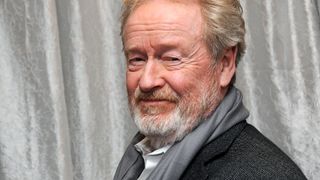
Ridley Scott's House of Gucci promotional tour has been a memorable one, that's for sure. The director – whose filmography includes Alien, Thelma & Louise, Blackhawk Down, Gladiator, and The Martian – has lampooned "boring" superhero movies, blamed The Last Duel's box-office failure on millennials being obsessed with their phones, and confirmed that a live-action Blade Runner show is in the works.
Sitting down with Total Film for our podcast (you can listen here), Scott's equally frank about things. Discussing the Gucci family publically complaining about the way Al Pacino and Jared Leto look in House of Gucci (they play Aldo and Paolo Gucci, respectively), Scott tells me: "You probably have the best actors in the world, you should be so fucking lucky."
Scott also talks about why he once dropped out of directing Dune, only for David Lynch to take over, because of his dislike of Mexico City, where the project was meant to film. And when commenting on his historical epic 1492: Conquest of Paradise, which had Garard Depideiu as its lead, he blames its box-office stumble on Americans not understanding European accents: "They don't hear shit unless it's from Texas or America, right?"
Here's our Q&A with the great director, edited for length and clarity. You can also listen to the conversion on the Inside Total Film podcast, embedded below and available on all major podcasting platforms.
Total Film: I've been reading that you're famously meticulously prepared for your shoots. With such a celebrated cast as the one in House of Gucci, how much room do you give them to play in a scene when you're shooting?
Ridley Scott: When you cast well, I am a very good caster I've discovered, I'm pretty good at casting, it's very important to cast properly because, if I cast really well, then half the pressure's off me on the day. I can then concentrate on the overall scheme of things. A great actor will help me as a partner, they will bring their own things to bear to it, because I don't believe in the Svengali process, except when you've got a difficult child. So I make sure I cast as best I can.
They're so sophisticated at this level. You've got to remember, an actor does it four times a year, or three times a year. I get to do it, even as a speedy director, I do it once a year. They're so far ahead of me on the racetrack. When I hit the ground running, I haven't been really talking to actors for nearly a year, and they've been talking to directors – good, bad, or indifferent – constantly throughout the year. It's a funny mixture when I arrive, and making myself known to them, what I do, how I do it, what I expect, and how I voice myself. And what I've tried to do is make, as soon as possible, a partnership. It's a partnership. It's not director, actor.
Sign up for the Total Film Newsletter
Bringing all the latest movie news, features, and reviews to your inbox
That's why, when meeting them beforehand, which normally I do, I'm really trying to create a friendship, because once you're into that situation of working in front of a big unit, and I'm asking a person to literally reveal themselves to this group of people, they have got to feel safe. From my point of view, I try to make the arena that they're about to enter safe, so they feel very well looked after. And then I find they open up and blossom.
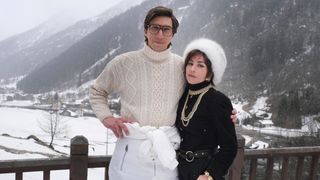
Total Film: Talking about casting, one of the big talking points here has been Lady Gaga as Patricia. She said that she was in character for 18 months. It feels like she committed to the role in a way that almost feels like someone trying to prove themselves, perhaps because she's a singer turned actor. What do you think has made her so successful in the role?
Ridley Scott: Lady Gaga is in competition with herself. That's her engine, she drives her own engine. In a funny kind of way, that also denominates her as an artist. She's a real artist, both as a singer of jazz, and also a singer of her music, and a producer of her huge shows that she does in Las Vegas shows. Her shows are enormous. That's part of her thing: she knows what she has to do, she knows she has to be prepared. And preparation is all about detail. Then once you're detailed, you can then relax, and it can appear to be not detailed or not overworked.
An actor – a very, very good actor – once said to me, "What's the worst thing about your job?" He said, he's Welsh, he says, "Well, boy, the worst thing is after I learn my lines, which is fucking murder, I have to learn everyone else's lines, so I can pretend I don't know what's coming." Which I thought was a great way of putting it.
Total Film: House of Gucci has been in development for so long. There were reports, back in the day, of Angelina Jolie, Penelope Cruz, Margot Robbie, all these names attached to various roles. What was it about this story that you really wanted to grab onto and made you need to tell it? And then, what clicked into place at this point in time for it to finally happen?
Ridley Scott: The bottom line is that it feels like a 15th Century story told in the 21st Century. It's not far off that Medici, or the Borgias digression – you can't call it progression, it was digression – had difficulty leading from one tragedy to another. [Note: the House of Medici was a powerful Italian banking family who produced four Popes through the 1500s and 1600s but eventually fell from power.]
This story was found by my wife [producer Giannina Scott] and she started to develop it from the [2001] book [titled The House of Gucci: A Sensational Story of Murder, Madness, Glamour, and Greed], which historically was pretty accurate, we think, as far as we know. But a book is not a screenplay. So then you have to have the screenplay adaptation. In the adaptation, you have to take some liberties with time and space, because a lot of the stories actually stretch out between her divorce and his demise. It was six years. In that six years, there was a lot of relentless pursuit by her of him. I don't know how he didn't get some kind of injunction to stop her from bothering him. So you have to play with time and space to make the story work. As the film stands right now, it's roughly two and a half hours, and which is longish for any film today, but I think it holds up in its evolution very well.
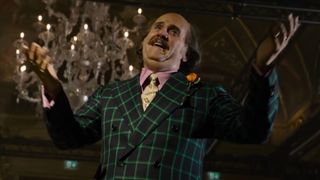
Total Film: Talking about the book it's based on, we've already seen real-life Gucci family members being less than happy with some of their portrayals on screen. Do you feel that a story like this is anyone's to tell? That it's in the public domain? Even though the people in it are still alive, but perhaps not quite consenting to the story being told.
Ridley Scott: There is that to it certainly. And therefore, I tried to be as respectful as possible by being as factual as possible, and as factual as we can possibly imagine. Time and space sometimes has to jump because of the nature of the length of the film. But the people that were writing from the family to us at the onset were alarmingly insulting, saying that Al Pacino did not represent physically Aldo Gucci in any shape or form. And yet, frankly, how could they be better represented than by Al Pacino? Excuse me! You probably have the best actors in the world, you should be so fucking lucky.
The story, in a funny kind of way, it's a satire. And therefore, satire is really a posh way of saying it's a comedy. And I think a lot of it is comedic. Certainly for the first two acts. Jared Leto, there's not a lot of information about [his character] Paolo, but there are pictures of Paolo and that's exactly what Paolo looks like. We found the pictures and Jared did what he did and dressed the way Paolo dressed. There's not a lot of Paolo on camera talking. And so that had to be, to a certain extent, imagined, but clearly Paolo was a very colorful and flamboyant man, was married to a woman who is a very good opera singer. The lady portraying Paolo's wife in this film has a really great voice, that's her singing. The flamboyance of Paolo was quite nicely captured. And how could that be offensive? We paid attention to not getting too overt if we can avoid it.
Total Film: Jared Leto is a scene-stealer in this, he's terrific. They all are. Now, I want to quickly take a small walk down memory lane, starting with your first film, The Duelists. When you reflect on your experience making that movie, do you think about the production, getting that movie made? Or do you look back and reflect on the legacy that movie has had?
Ridley Scott: You have to remember, by the time I was 27, I had already started my own company in London. The company was flying, called RSA, I was doing television commercials at that point. I'd personally do 100 commercials a year, myself. I was the first one to get into the stable – I'm sure directors don't mind being called like thoroughbreds – into a stable of directors. I was the first one to get really key, very posh directors on board to work within the company. It was a healthy team, within a company and a competitive team. It was a very creative company. Because it was so successful I opened up in Paris in New York, then LA. By now, I'm 38, and I haven't even noticed I haven't done a film yet. And so I thought, "Oh my god, I better start making movies."
Because we had been making money, I was able to start offsetting some of the that against having screenplays written. And had written two scripts by the same writer called Jerry Vaughan-Hughes before I got going. He wrote the Gunpowder Plot for me, which is still fantastic and makable and should be made today. And then The Duelist was the one that appealed to me because it felt like a Western, about the mindlessness behind violence where you can't even remember what the original argument was about. And that was a great bottom line on what The Dualists was.
Doing it, honestly, I became so practiced doing 100 commercials a year. And I'm also probably one of the best camera operators in the business. So I operated on The Duelists, Alien. I was not allowed to operate on Blade Runner. And when I'm in London, I'm operating on a camera. I'm so versed as a filmmaker that, doing The Dualists, I was like, "Jesus, that was easy, next!" We did that in eight and a half weeks in the pouring rain in the Dordogne [France]. David Puttnam, who was my producer at the time, said, "Listen, they want to do it for the British entry at Cannes, are you up for that?" I said, "Absolutely." So we were the British entry at Cannes, that was my first film, and we won. We won the Grand Jury Prize at Cannes for what they call the Folden Egg. In French, it sounds better.
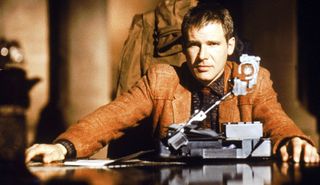
Total Film: You went from that into Alien, but between Alien and Blade Runner, you went into production on Dune. We ended up with David Lynch's version which was what it was, and now we have Denis Villeneuve's very accomplished take on the book. Do you feel that technology has finally caught up with that story? Or do you think it's always been fillable?
Ridley Scott: It's always been filmable. I had a writer called Rudy Wurlitzer, of the Wurlitzer family, you know the Jukebox?
Total Film: Yes!
Ridley Scott: He'd written two films: Two-Lane Blacktop with James Taylor, and Pat Garrett and Billy the Kid, which had Bob Dylan and Kris Kristofferson. My brain's working quite well today, actually! We did a very good take on Dune, because early days, I'd work very, very closely with the writer. I was always glomming the look of the film onto what he or she was writing. And then [producer] Dino [De Laurentiis] had got me into it and we said, "We did a script, and the script is pretty fucking good." Then Dino said, "It's expensive, we're going to have to make it in Mexico." I said, "What!" He said, "Mexico." I said, "Really?" So he sent me to Mexico City. And with the greatest respect to Mexico City, in those days [it was] pretty pongy. I didn't love it. I went to the studio in Mexico City where the floors were Earth floors in the studio. I said, "Nah, Dino, I don't want to make this a hardship." And so I actually backed out and instead moved on to Legend. Tim Curry and Tom Cruise.
Total Film: A very interesting fantasy film. And, from there, you went into another interesting film, one I watched for the first time last night, 1492: Conquest of Paradise [a historical epic about Christopher Columbus starring Gerard Depardieu in the lead role that was met by mixed reviews].
Ridley Scott: Oh! I mean, Gerrard is fantastic. His French accent, I don't think it got in the way at all, because I understood exactly what he was doing. But the studio were going "Yeah, we can't understand him." The British ear – did you have any problem understanding it?
Total Film: No.
Ridley Scott: No. In America, their ear, they're not used to different accents. They don't hear shit unless it's from Texas or America, right? Or North Carolina. In Europe, we are used to accents, and so Gerard's accent never bothered me at all. But that was an independent movie, I raised $47 million for an independent movie, are you kidding me? At Cannes, a friend at Paramount bought the rights $10 million. And then I had to sit at Cannes, which I hadn't done since The Duelists, and my experience at Cannes had not been good on The Duelists, I didn't want to go back. But I had to go back and pitch the movie. That production design was remarkable. Did you see a good print or a dodgy print?
Total Film: The blu-ray.
Ridley Scott: That must look fantastic.
Total Film: Visually it holds up, definitely.
Ridley Scott: It's one of my favorite films. What's interesting, they didn't know how to release it in America. But in Europe, it clocked $57 million.
But, I was going to say about The Duelists, they made seven prints, even though we won a prize at Cannes. I said to [producer] David Puttnam, "Is this normal?" He said, "No, it's not normal, clearly they don't want it." But if we had independent movie platforms, such as Weinstein – Harvey Weinstein and his brother – they would have known what to do with The Duelists. And they'd probably would have got it Academy nominations. But because Paramount didn't know what to do with it, it died on the sidelines. And yet it runs today as a five-star quote "masterpiece" on Netflix, which was killed 35 years ago, which was pretty stupid, so I go, "Fuck you. Fuck you."
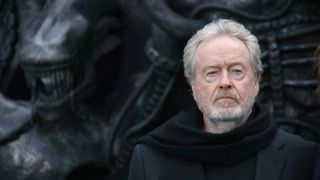
Total Film: More recently, then, you've been making films revisiting old classics, making Prometheus and Alien: Covenant, and soon there's a Gladiator sequel. Do you think you are becoming a more reflective filmmaker?
Ridley Scott: I've got no reflection in me whatsoever. It's entirely random and there is no plan. That's how you keep alive. I don't reflect. I hate awards. I turn them down. Because I say it's not over yet.
Total Film: I'm running out of time, but I wanted, along those lines, to touch on the year 2001. You had huge success with Gladiator the year before, then Black Hawk Down and Hannibal came out. You've got awards and box office success. Does that matter to you at all?
Ridley Scott: No. What matters is that I can continue doing what I'm doing. In a funny way, I started off with the idea of becoming a painter, a serious painter. And I always had a problem with it. I would wrestle with painting at art school, a very good little art school in West Hartlepool, Durham. Painting would have meant, for me, if I could pull it off, that I went to the Royal College, I watched David Hockney take off, vroom, on his Formula One canvas. There's no way I'm going to even attempt to do that. Filming took over the place of painting for me, because every painting is a brand new canvas, and it's random.
House of Gucci is in cinemas now. For more, check our the best upcoming movies heading our way over the next year.

Jack Shepherd is the former Senior Entertainment Editor of GamesRadar. Jack used to work at The Independent as a general culture writer before specializing in TV and film for the likes of GR+, Total Film, SFX, and others. You can now find Jack working as a freelance journalist and editor.
Most Popular



